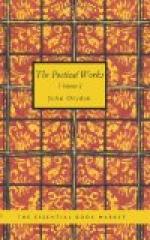peculiar goodness of the best of kings, that we may
praise his subjects without offending him. Doubtless,
it proceeds from a just confidence of his own virtue,
which the lustre of no other can be so great as to
darken in him; for the good or the valiant are never
safely praised under a bad or a degenerate prince.
But to return from this digression to a further account
of my poem; I must crave leave to tell you, that as
I have endeavoured to adorn it with noble thoughts,
so much more to express those thoughts with elocution.
The composition of all poems is, or ought to be, of
wit; and wit in the poet, or wit-writing (if you will
give me leave to use a school-distinction) is no other
than the faculty of imagination in the writer, which,
like a nimble spaniel, beats over and ranges through
the field of memory, till it springs the quarry it
hunted after: or, without metaphor, which searches
over all the memory for the species or ideas of those
things which it designs to represent. Wit written
is that which is well designed, the happy result of
thought, or product of imagination. But to proceed
from wit, in the general notion of it, to the proper
wit of an heroic or historical poem; I judge it chiefly
to consist in the delightful imaging of persons, actions,
passions, or things. It is not the jerk or sting
of an epigram, nor the seeming contradiction of a
poor antithesis (the delight of an ill-judging audience
in a play of rhyme) nor the jingle of a more poor
Paronomasia; neither is it so much the morality of
a grave sentence, affected by Lucan, but more sparingly
used by Virgil; but it is some lively and apt description,
dressed in such colours of speech, that it sets before
your eyes the absent object, as perfectly, and more
delightfully than nature. So then the first happiness
of the poet’s imagination is properly invention
or finding of the thought; the second is fancy, or
the variation, deriving or moulding of that thought,
as the judgment represents it proper to the subject;
the third is elocution, or the art of clothing and
adorning that thought, so found and varied, in apt,
significant, and sounding words: the quickness
of the imagination is seen in the invention, the fertility
in the fancy, and the accuracy in the expression.
For the two first of these, Ovid is famous among the
poets; for the latter, Virgil. Ovid images more
often the movements and affections of the mind, either
combating between two contrary passions, or extremely
discomposed by one. His words therefore are the
least part of his care; for he pictures nature in
disorder, with which the study and choice of words
is inconsistent. This is the proper wit of dialogue
or discourse, and consequently of the drama, where
all that is said is to be supposed the effect of sudden
thought; which, though it excludes not the quickness
of wit in repartees, yet admits not a too curious
election of words, too frequent allusions, or use of
tropes, or, in fine, anything that shows remoteness




